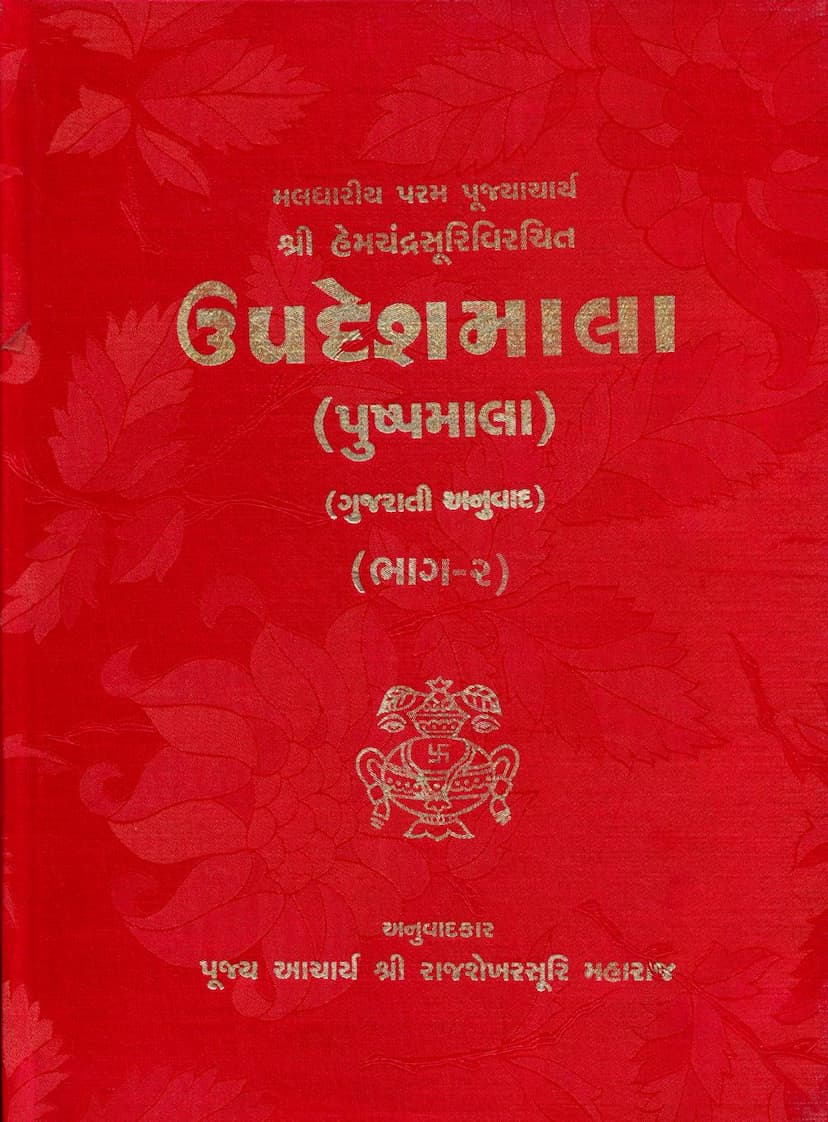Updeshmala Ppart 02
Added to library: September 2, 2025

Summary
The book "Updeshmala Part 02" by Hemchandrasuri, Rajshekharsuri, and Dharmshekharvijay, published by Arihant Aradhak Trust, is the second volume of a commentary and translation (in Gujarati) of the Updeshmala, originally authored by Acharya Hemchandrasuri. The translation and commentary are attributed to Acharya Dev Shri Vijayprem Surishwarji Maharaj and Acharya Dev Shri Vijayhirsurishwarji Maharaj, with the blessings and guidance of Acharya Shri Rajshekharsuri Maharaj. The publication is financially supported by Shri Shripal Nagar Jain J.M. Derasar Trust, Mumbai.
The book is an extensive compilation of teachings and stories relevant to Jain principles and practices, particularly focusing on the conduct and spiritual development of monks and the spiritual path in Jainism.
Key Themes and Content Summary:
The book is structured into various "dwars" (sections or chapters) that delve into different aspects of the spiritual journey, offering detailed explanations and illustrative stories. Based on the extensive index provided, here's a thematic summary:
-
Foundation of Conduct (Samiti and Gupti): The book emphasizes the paramount importance of the five Samitis (careful conduct in walking, speech, eating, taking and putting objects, and excretion) and three Guptis (control of mind, speech, and body). It explains how these are the essence of Jain practice and the foundation for observing the Mahavratas (great vows). The text highlights that the entire Jain teaching (Dwadashangi) is contained within these Samitis and Guptis.
-
Detailed Explanation of Samitis and Guptis: Each of the five Samitis (Irrya, Bhasha, Eshana, Aadan-Nikshepan, Parishthapanika) and three Guptis (Mana, Vachan, Kaya) are explained with their definitions, methods of practice, and the importance of adhering to them with utmost care and vigilance. This includes detailed discussions on the principles of right conduct in various situations.
-
Illustrative Narratives (Drishtanta/Katha): A significant portion of the book comprises stories of enlightened beings (like Varadatta Muni, Sangat Sadhu, Dhanasharma Sadhu, Dharmaruchi Muni, Somilaarya, Jinadas, Gunadatta Sadhu, Chandpingal, Kunic, etc.) who either perfectly followed these principles or faced challenges related to them. These stories serve as practical examples to understand the teachings and the consequences of adhering to or deviating from them.
-
Moral and Ethical Teachings: The book extensively covers various ethical principles, including:
- Control of Senses (Indriya Jay): Detailed explanations on the types of senses, their objects, and the dangers of attachment to them, illustrated by stories of individuals who were overwhelmed by sensory desires.
- Control of Passions (Kashaya Nigraha): The nature and forms of the four passions (Krodh, Man, Maya, Lobh) are explained, along with their consequences (Vipak) and methods of control. The text emphasizes Lobh (greed) as particularly powerful.
- Virtues and Conduct: Emphasis is placed on virtues like patience, contentment, humility, truthfulness, and the importance of good conduct for spiritual progress.
- Renunciation and Detachment (Bhavavirag): The text explores the impermanence of worldly pleasures, the suffering inherent in worldly existence, and the necessity of detachment from worldly attachments for spiritual liberation. Stories of detachment are provided.
- Importance of a Guru and Conduct in Gurukul: The book details the qualities of a true Guru and the importance of living in a Gurukul (teacher's abode) for spiritual learning and adherence to principles. It also discusses the faults of neglecting the Guru or the community (Gachha).
- Vow Observance: The text stresses the importance of observing vows (like Brahmacharya, Aparigraha) meticulously and the dire consequences of even minor violations.
-
Specific Practices and Principles:
- Aadan-Nikshepan Samiti: Care in handling objects.
- Parishthapanika Samiti: Proper procedure for excretion and related activities.
- Vainaya (Respect and Humility): The significance of humility and respect towards elders, Gurus, and the teachings.
- Alochan (Confession): The process of confession of sins to a Guru and its importance for purification.
- Nishkama Karma and Detachment: The concept of acting without attachment to results, and detachment from worldly possessions and relationships.
- Spiritual Discernment (Vicharan): The necessity of careful consideration of actions, intentions, and their consequences.
- The Significance of Navkar Mantra: The text highlights the power and importance of the Navkar Mantra as the essence of the twelve Angas of Jain scripture.
-
Consequences of Actions (Vipak): The book repeatedly illustrates how actions, both positive and negative, have corresponding consequences, either in this life or in future lives. This is shown through the stories of individuals who achieved spiritual heights or suffered greatly due to their deeds.
-
Duality of Principles (Nishchay and Vyavahar): The text touches upon the interplay between ultimate truth (Nishchay Naya) and practical application (Vyavahar Naya), emphasizing the need to understand and integrate both in the spiritual journey.
Overall Purpose:
"Updeshmala Part 02" aims to provide a comprehensive guide for spiritual seekers, particularly those on the path of renunciation, offering practical advice, ethical guidelines, and profound philosophical insights rooted in Jain tradition. The stories and explanations are designed to cultivate detachment from the material world, foster ethical conduct, and guide the reader towards spiritual liberation (Moksha). The devotional aspects, such as prayers and salutations to Jain Tirthankaras and deities, are also present, underscoring the devotional component of the spiritual path. The book serves as a resource for understanding the depth of Jain teachings on conduct, morality, and the path to ultimate salvation.